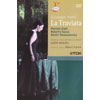Verdi (La) Traviata
Venice rediscovers Traviata as it was first performed
View record and artist detailsRecord and Artist Details
Composer or Director: Giuseppe Verdi
Genre:
DVD
Label: TDK
Magazine Review Date: 4/2006
Media Format: Digital Versatile Disc
Media Runtime: 146
Mastering:
Stereo
Catalogue Number: DV-OPLTLF

Tracks:
| Composition | Artist Credit |
|---|---|
| (La) traviata |
Giuseppe Verdi, Composer
Andrea Porta, Baron, Baritone Dmitri Hvorostovsky, Giorgio Germont, Baritone Elisabetta Martorana, Annina, Soprano Eufemia Tufano, Flora, Mezzo soprano Federico Sacchi, Doctor, Bass Giuseppe Verdi, Composer Lorin Maazel, Conductor Luca Favaron, Giuseppe, Tenor Patrizia Ciofi, Violetta, Soprano Roberto Saccà, Alfredo Germont, Tenor Salvatore Cordella, Gastone, Tenor Teatro La Fenice Chorus Teatro La Fenice Orchestra Vito Priante, Marquis, Bass |
Author: John Steane
This is important. The bluntness may I hope be excused because for once we have a recording which has every right to call itself ‘historical’ yet could well be overlooked as just ‘another Traviata’. It is indeed ‘another’ Traviata, one we may not have heard before, being the score of the famously disastrous premiere after which Verdi subjected it to revision. The original score remained then in the Fenice archive, and it was surely an inspired idea to open the theatre rebuilt after the fire with the first performance since 1853 of the opera as heard on that historic first night of March 6.
The changes, however, are not those of a man anxious to tailor his work to suit the public taste. Essentially they are those of a musician who seeks to tighten up here and there, or who simply thinks ‘I can do better than that’. The outstanding example is the rewriting of the climactic phrases in the great ensemble at the end of Act 2.
The revisionary pen has otherwise been most active in the Violetta-Germont duet, where the unprepared listener (familiar with the normal version) may wonder momentarily whether he has actually heard what he thinks he’s heard or whether he has perhaps nodded off and missed something. The reasons for change are not always obvious – and are certainly not of the kind that would overnight turn fiasco into assured success.
The performance itself flaunts the art of the producer rather as it was formerly the habit to exhibit the prima donna. The banknote is a visual leitmotif. Violetta takes banknotes from men throughout the Prelude to Act 1; banknotes descend like autumn leaves in Act 2 scene 1 (played, somewhat incongruously, out of doors) and lie thick upon the ground. It may be that their absence gives additional poignancy to Act 3, where the unexpected setting (no bed in sight) may possibly induce a modern audience to feel something of the shock that supposedly ran through the audience of that first night so long ago.
Otherwise the evening has at its centre the finely sung and intensely well acted Violetta of Patrizia Ciofi. Her voice, a little more loose now in its vibrations, is still beautiful, and her distressed face will haunt the memory for long to come. Roberto Saccà sings with fresh, well focused tone and is a resourceful actor. Hvorostovsky, by comparison, is stiff and formal but sings richly. Maazel conducts in a way that always holds interest, and when he adopts a tempo slower than normal there is usually good reason for it.
The changes, however, are not those of a man anxious to tailor his work to suit the public taste. Essentially they are those of a musician who seeks to tighten up here and there, or who simply thinks ‘I can do better than that’. The outstanding example is the rewriting of the climactic phrases in the great ensemble at the end of Act 2.
The revisionary pen has otherwise been most active in the Violetta-Germont duet, where the unprepared listener (familiar with the normal version) may wonder momentarily whether he has actually heard what he thinks he’s heard or whether he has perhaps nodded off and missed something. The reasons for change are not always obvious – and are certainly not of the kind that would overnight turn fiasco into assured success.
The performance itself flaunts the art of the producer rather as it was formerly the habit to exhibit the prima donna. The banknote is a visual leitmotif. Violetta takes banknotes from men throughout the Prelude to Act 1; banknotes descend like autumn leaves in Act 2 scene 1 (played, somewhat incongruously, out of doors) and lie thick upon the ground. It may be that their absence gives additional poignancy to Act 3, where the unexpected setting (no bed in sight) may possibly induce a modern audience to feel something of the shock that supposedly ran through the audience of that first night so long ago.
Otherwise the evening has at its centre the finely sung and intensely well acted Violetta of Patrizia Ciofi. Her voice, a little more loose now in its vibrations, is still beautiful, and her distressed face will haunt the memory for long to come. Roberto Saccà sings with fresh, well focused tone and is a resourceful actor. Hvorostovsky, by comparison, is stiff and formal but sings richly. Maazel conducts in a way that always holds interest, and when he adopts a tempo slower than normal there is usually good reason for it.
Discover the world's largest classical music catalogue with Presto Music.

Gramophone Digital Club
- Digital Edition
- Digital Archive
- Reviews Database
- Full website access
From £8.75 / month
Subscribe
Gramophone Full Club
- Print Edition
- Digital Edition
- Digital Archive
- Reviews Database
- Full website access
From £11.00 / month
Subscribe
If you are a library, university or other organisation that would be interested in an institutional subscription to Gramophone please click here for further information.




